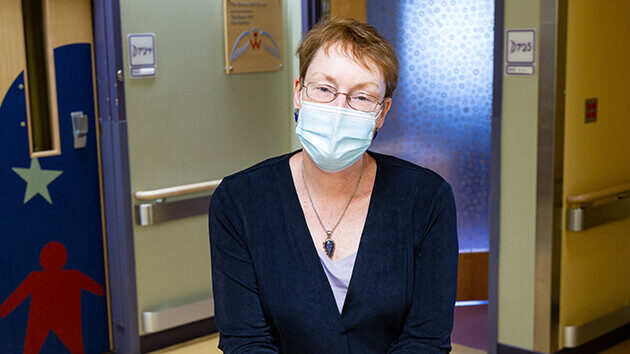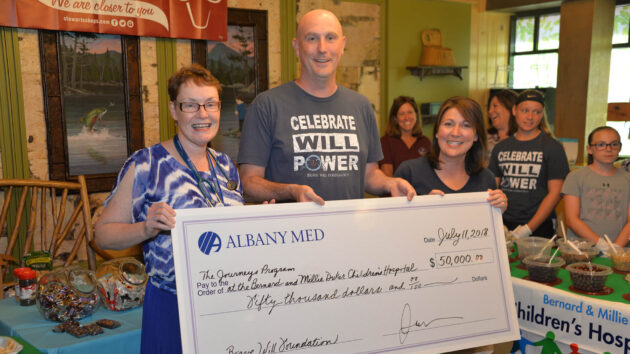Palliative Care Takes on New Role During Covid-19 Pandemic

When Covid-19 hit our community in 2020, Joanne Porter, MD, was among those called into action as Albany Med’s foremost expert on palliative care. As the director of the Journeys Program within the Bernard & Millie Duker Children’s Hospital, she and her team—nurses, doctors, a chaplain and a social worker—address the physical, emotional and spiritual needs of young patients and their families who are facing life-threatening, debilitating or terminal medical conditions.
Dr. Porter’s experience—and her ability to connect with patients and families in crisis—made her uniquely suited to care for patients with Covid-19. And she rose to the challenge without hesitation.
In April of 2020—what many consider the darkest early days of the pandemic—Dr. Porter helped mobilize four palliative care teams to cover the hospital’s adult intensive care units. A cohort of patients from New York City who were very sick and dying had just been transferred to Albany Med from beleaguered hospitals in Queens.
“Our goal was to triage care for the sickest of the sick,” Dr. Porter said. “It really was like being in a war. It was all hands on deck.”
Dr. Porter and her colleagues worked to facilitate daily remote communication between patients and their loved ones. They coordinated pain and symptom management, and, in some cases, end of life care and bereavement support.
Edward Philbin III, MD, chair of the Department of Medicine and George E. Pataki Endowed Chair in Cardiology, said Dr. Porter brought leadership, organization and direction to the understaffed adult palliative care program during those early months of the Covid-19 pandemic. “The empathy, caring and devotion that she and all the team members showed at that time, it will stick with me forever,” he said.
The intense nature of her work has taught Dr. Porter that life’s hardest, most excruciating battles often yield profound grace. This was no less true during the pandemic. Not only did she find a further calling—she is currently working to establish an adult palliative care program at Albany Med—she also experienced one of the most poignant full-circle moments of her career.
Dr. Porter came to Albany Med in 1993 and, in addition to clinical skill, she demonstrated a special aptitude for relating to patients. Like many of her colleagues at the Melodies Center for Childhood Cancer & Blood Disorders, she has shaved her head in solidarity with young cancer patients. Through her work with the Journeys Program, she gives her personal cell phone to patients and their families, and even makes house calls when a child is extremely medically fragile.
The Journeys Program, she explained, was inspired by “a remarkable family,” the Hladuns, of Ballston Lake.
In 2009, at just two months old, Tammy and Matt Hladuns’ son, Willem, was diagnosed with a rare form of cancer. After aggressive treatments, including six surgeries and six rounds of chemotherapy, the Hladuns decided that what Will needed most was their love and comfort. They remained by his side, camped out in his hospital room. Family and friends would come and go well past visiting hours. It didn’t matter to them that they got little comfortable sleep. It mattered that they were at their son’s side.
After Will passed at the age of 7 months, the Hladuns collaborated with Dr. Porter to establish the Brave Will Room, a space within the children’s hospital for families to gather privately while a loved one is receiving palliative care.
“It really is one of the cornerstones of our Journeys Program,” Dr. Porter said.
In the years since, the Journeys Program has blossomed to serve hundreds of children and their families, and it also prepared Dr. Porter to come to the aid of patients with Covid-19.
On Christmas Eve of 2020, a 74-year-old Covid patient named Bernie Murphy from Burnt Hills arrived at Albany Med by ambulance. He was Tammy Hladun’s father.
When the hospital called Hladun to explain they were arranging for palliative care for her father with a physician named Dr. Porter, she said she was overcome.
“I thought back to Will,” she said, “and this may sound strange, but I remember staring at Dr. Porter’s jacket when Will was diagnosed. It said ‘Oncologist.” And my brain wasn’t registering cancer. So much was happening. She said to us that day—we didn’t know her at all—she said, ‘I’m going to be here from today. I will never leave your side.’ And in all these years, she checks on us. There are texts. Phone calls. Even though she’s busy, we don’t always see her, but she’s always there.”
It was no different with her father. “She would go in and see him every day,” Hladun said. “She would bring him a newspaper, even though he couldn’t read it. She kept offering him that dignity, which is so important.
“My dad was an anxious man. And Dr. Porter brought him peace. She would say, ‘Bernie, what’s making you nervous? How can I help you?’”
Ultimately, when it was deemed medically safe—and in close collaboration with Murphy, his family, hospice and nursing supports—Dr. Porter helped arrange for Murphy’s safe transfer home by ambulance. He was with his family when he passed away the following day.
“All of us were around him,” Hladun said. “We toasted him. We played his favorite music. We learned that from Will,” Hladun said, “to celebrate all the moments.”
“It was emotional. I think it always is,” Dr. Porter said. “We talk about Will all the time and how he has transformed how we manage a death in Pediatrics. And I’d like to think that he’s a part of what’s going on now as we work to build an adult palliative care team.”
For a lifetime of exemplary contributions to her field and the community, Dr. Porter was honored as a Woman of Excellence by the Capital Region Chamber’s Women’s Business Council in the Distinguished Career Category during a virtual ceremony in May.
